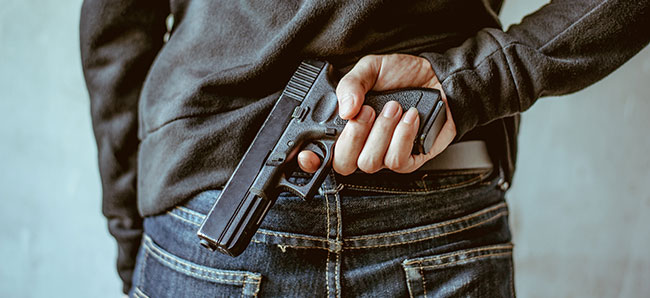Firearms and Cannabis – What is the Law?
The adopted land of Billy the Kid, New Mexico has always been known for its armed citizenry. Since the dawn of the territory, and likely before it, there have been more firearms than residents by wide margin. Indeed, Article II, Section 6, of the New Mexico Constitution enshrines the citizen’s right to bear arms stating, “No law shall abridge the right of the citizen to keep and bear arms for security and defense, for lawful hunting and recreational use and for other lawful purposes, but nothing herein shall be held to permit the carrying of concealed weapons.”
However, with the passage of the Cannabis Regulation Act (CRA), which legalized adult cannabis recreational use, there is now conflicting law regarding firearms and cannabis. Indeed, as everyone knows or should know, despite cannabis being legal on a State level within the borders of the State of New Mexico, participation in the cannabis industry is still federally prohibited conduct. And with that federal prohibition, comes a conflict of laws regarding cannabis and firearms. You do not want to be on the wrong side of the law on this.
In short, an entity and its employees, should not maintain, bring, or otherwise possess firearms on the premises of a state licensed cannabis entity.
State Laws and Rules.
Addressing the State law and rules, the Cannabis Regulation Act is notably silent in addressing any relationship between firearms and licensed cannabis establishments. That said, there are few rules promulgated by the Cannabis Control Division (CCD) in addressing the relationship between firearms and cannabis entities. For instance, NMRA 16.8.2.10(O) reads: “Security guards are permitted but not required. Contract security guards must be licensed under the Private Investigations Act, Section 61-27B-1 et seq., NMSA 1978. Security guards must not consume cannabis or cannabis products or be intoxicated while performing any duties for a licensee. Security guards must comply with all laws related to firearms and other weapons.”
Additionally, the State CCD Courier Application addresses firearms and cannabis. Applicants must attest, in obtaining a Courier License, that, “Licensees shall not possess or permit the possession of a firearm on any premises, including a building or vehicle, utilized by the courier.” This attestation is to protect the entity from conflict with and consequences of federal law.
Federal Law.
Enter the Supremacy Clause, which means that federal law is the law of the land, especially regarding guns and drugs. The penalties for convictions of firearms and cannabis can be found in 18 USC 924 (c)(1), which states:
Except to the extent that a greater minimum sentence is otherwise provided by this subsection or by any other provision of law, any person who, during and in relation to any crime of violence or drug trafficking crime (including a crime of violence or drug trafficking crime that provides for an enhanced punishment if committed by the use of a deadly or dangerous weapon or device) for which the person may be prosecuted in a court of the United States, uses or carries a firearm, or who, in furtherance of any such crime, possesses a firearm, shall, in addition to the punishment provided for such crime of violence or drug trafficking crime-
(i) be sentenced to a term of imprisonment of not less than 5 years;
(ii) if the firearm is brandished, be sentenced to a term of imprisonment of not less than 7 years; and
(iii) if the firearm is discharged, be sentenced to a term of imprisonment of not less than 10 years.
(B) If the firearm possessed by a person convicted of a violation of this subsection-
(i) is a short-barreled rifle, short-barreled shotgun, or semiautomatic assault weapon, the person shall be sentenced to a term of imprisonment of not less than 10 years; or
(ii) is a machinegun or a destructive device, or is equipped with a firearm silencer or firearm muffler, the person shall be sentenced to a term of imprisonment of not less than 30 years.
(C) In the case of a violation of this subsection that occurs after a prior conviction under this subsection has become final, the person shall-
(i) be sentenced to a term of imprisonment of not less than 25 years; and
(ii) if the firearm involved is a machinegun or a destructive device, or is equipped with a firearm silencer or firearm muffler, be sentenced to imprisonment for life.
Stated differently, the statute holds that if you are convicted of possession or using a firearm in the connection with a federal cannabis crime, you are potentially looking at substantial federal prison time.
You might be asking yourself – wasn’t there a case recently from Oklahoma that dealt with cannabis and firearms? Yes, indeed. However, that case, US v. Harrison, dealt with a cannabis user’s federal possessory firearm rights under 18 USC 922(g), and not a state licensed cannabis entity and firearms under 18 USC 924. In any event, the indictment was dismissed by the Court on Constitutional grounds, though the Department of Justice has appealed the dismissal of that case and we will see what happens.
Why is this important to entities engaged in the cannabis industry?
In short, if firearms are on premises of a state licensed cannabis business, it very well may be construed that you or your entity may be in violation of 18 USC 924(c) and be subject to mandatory minimums of five (5) years for the first federal conviction and twenty-five (25) years for each subsequent federal conviction, which also must be served consecutive to any other underlying sentence imposed. The now rescinded Cole Memorandum spoke to this issue and offered guidance to state licensed cannabis entities. Indeed, in addition to several other priorities, the Cole Memorandum outlined a major priority of the Federal government to prevent “the use of firearms in the cultivation and distribution of marijuana.” This speaks to the federal prohibition of firearms and cannabis.
In any case, while the state law and rules are less than clear regarding firearms and cannabis, the federal law is clear. If for whatever reason you, your entity, or even an employee, possesses or otherwise maintains a firearm on a state licensed entity, you or your entity is exposed to federal criminal liability with mandatory minimums if convicted of 18 USC 924.
Even if the risk of prosecution is low, federal prosecution and imprisonment is nothing to scoff at, and a firearm should never be brought onto the premises of a licensed cannabis entity.
Law 4 Small Business (L4SB). A little law now can save a lot later. A Slingshot company.





